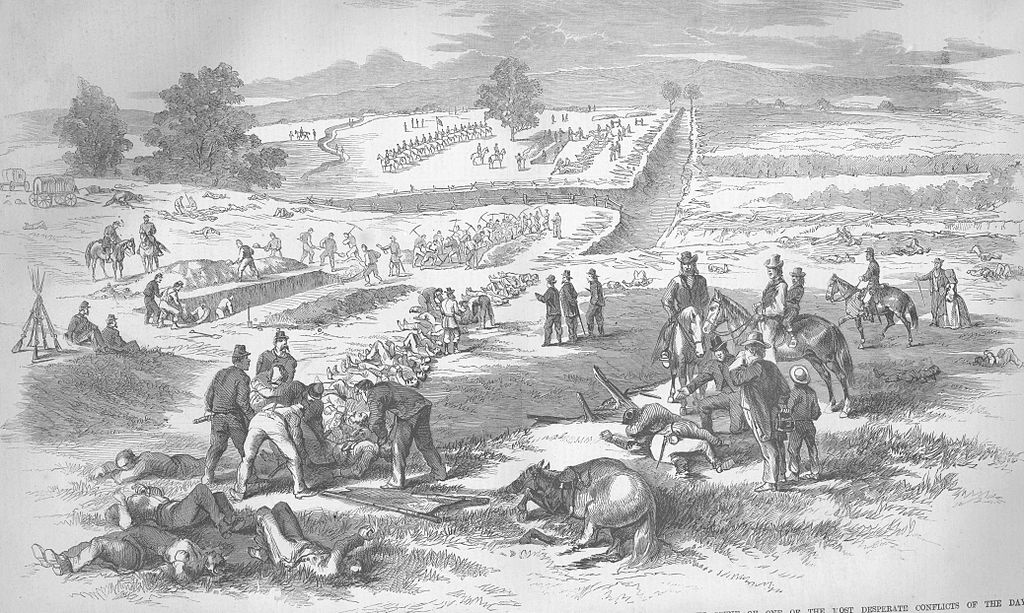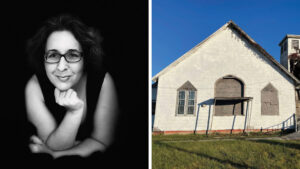A lot of people don’t know about the role played by Jews during the Civil War. Brad Stone, a volunteer docent at the National Museum of Civil War Medicine, wants to change that.
A history buff who also volunteers for the USS Constellation in Baltimore, Stone will deliver a talk on “Jewish Americans and the Civil War” on May 10 at 7 p.m. at the museum, at 48 E. Patrick St. in Frederick. His talk will be in honor of May’s designation as “Jewish American Heritage Month.”

A retired press spokesman for the U.S. Food & Drug Administration and the Substance Abuse and Mental Health Services Administration, Stone, 61, lives in the Montgomery County community of Darnestown with his wife, Theresa.
A native of Hanover, Mass., he is a member of the 16th Reenactment Group based in Hanover, Pa.
Jmore: When did you become a Civil War buff?
Stone: Since I was a kid, and over the years that has not diminished at all.
Why does that war haunt and fascinate us?
Every war America has fought has impacted us, but the Civil War in some ways more so. It deals with a lot of things that are fundamental to our nation and to the core of what America is all about – freedom, the unity of our nation. There are so many aspects of it that still affect us today, like civil rights and some of the tensions in our society. The more you study the Civil War, the more you learn about American society today. A lot of contemporary issues, even the whole issue with [Confederate] statues, still tap into our nation today.
Did Jews fight in the war?
There were about 150,000 Jews in the U.S. at that time, most in the North. They represented .5 percent of the population. About 8,000 Jews fought for the Union army or navy, and about 3,000 for the Confederacy. It was not an insignificant amount, and there were some prominent Jews in the [Union] army and navy, and Jewish officers in the Confederate army
Misperceptions about Jews during the war?
There is a common misperception, even among Jews, that Jews did not play much of a role in the war, even that Jews were not around. The more I looked into it, the more I saw that Jews were around and played a large role on both sides. It was the first time that Jews played a role in a major national situation, disproportionately considering the small Jewish population of that time. The whole Civil War era was transitional for American Jewish history, especially in the decision-making of that period. There are some significant things that happened and transformed American Jews by the end of the war. It was a fascinating time.
Examples?
At the start of the war, American Jewish influence was really much more pronounced in the South. A lot of Southern Jews immigrated here earlier in history and were more established and assimilated than their Northern counterparts. There were more Jews in the North but as far as influence and strata of society, Jews in the South had more of an impact. By the end of the war, that all changed. The Jewish community in the North became more prominent and influential in terms of the Jewish community and American culture in general.
Why?
The victory [of the Union] played a large part, but you had people like Rabbi [David] Einhorn [of Baltimore’s Har Sinai Congregation] and others in the North who survived the German Revolution of 1848 and wanted to be at the forefront of new American ideals. They didn’t necessarily start out as abolitionists, but their attitudes toward slavery and human rights changed over the course of the war. I think the community actually became very influential beyond the Jewish community, and as the war went on people became convinced that slavery was inherently evil.
Does Southern Jewry get a bum rap?
That’s a tricky one. It’s important not to view things from a contemporary perspective. Jews in the South were really no different than their Southern brethren in terms of slavery. They tolerated it, and some had slaves and were slave traders. That’s not something to be proud of, but nonetheless it should be recognized. The Jewish community in the South fought for a cause that was not a good one.
Some Southern Jews did wonderful, humanitarian things, and some Northern Jews didn’t always do the right thing. Before the war, Rabbi Morris Jacob Raphall said the Bible condones slavery; he was a prominent New York rabbi. Even in Baltimore’s Jewish community, there was an intense debate that led to violence about how you should regard slavery. A prominent Jewish family, the Friedenwalds, were among the leaders of the [1861] Pratt Street Riots against Union troops. And mobs destroyed Rabbi Einhorn’s newspapers and drove him to flee to Philadelphia.
Will you talk about Ulysses S. Grant and his controversial General Order No. 11, which ordered the expulsion of Jews in his military district?
I will touch on that. I’ve always been a big fan of General Grant. A lot of people look askance at that, but I think General Order No. 11 is a very small part of the overall story. When people view that story, they will view Grant in a different way. His overall history with Jews was different, and people will be shocked. He always felt tremendous remorse about [General Order No. 11]. It’s an interesting odyssey.
What about Judah P. Benjamin, the Confederacy’s Jewish secretary of state?
I have a different take on him. I think he was someone who was very dedicated to the Southern cause, including the institution of slavery. He owned slaves himself and had no problem with slavery. He was not a moderating force in the Confederacy.
What do you hope people take away from your lecture?
A better appreciation for the role Jews played in the war and how many of the changes in the Jewish community during the war changed not only the dynamics of Jewish culture in the U.S. but also had a big influence on the country that are with us to this day.
One last question: As a reenactor, how do you feel about how they’re viewed by our culture in a less than flattering light?
For the most part, they’re a great, friendly group of people from all walks of life. People assume they’re ultra-serious, but they actually tend to have a good sense of humor. They’re people who are dedicated to sharing information about the Civil War and want to make sure it’s not erased from history. They want to pay homage to the sacrifices that were made.
For information about Stone’s talk, visit civilwarmed.org. He will also deliver a talk on Baltimore’s role in the Civil War on Sept. 1 aboard the USS Constellation as part of its “Mariner Series.” For information, visit historicships.org/constellation.html.





